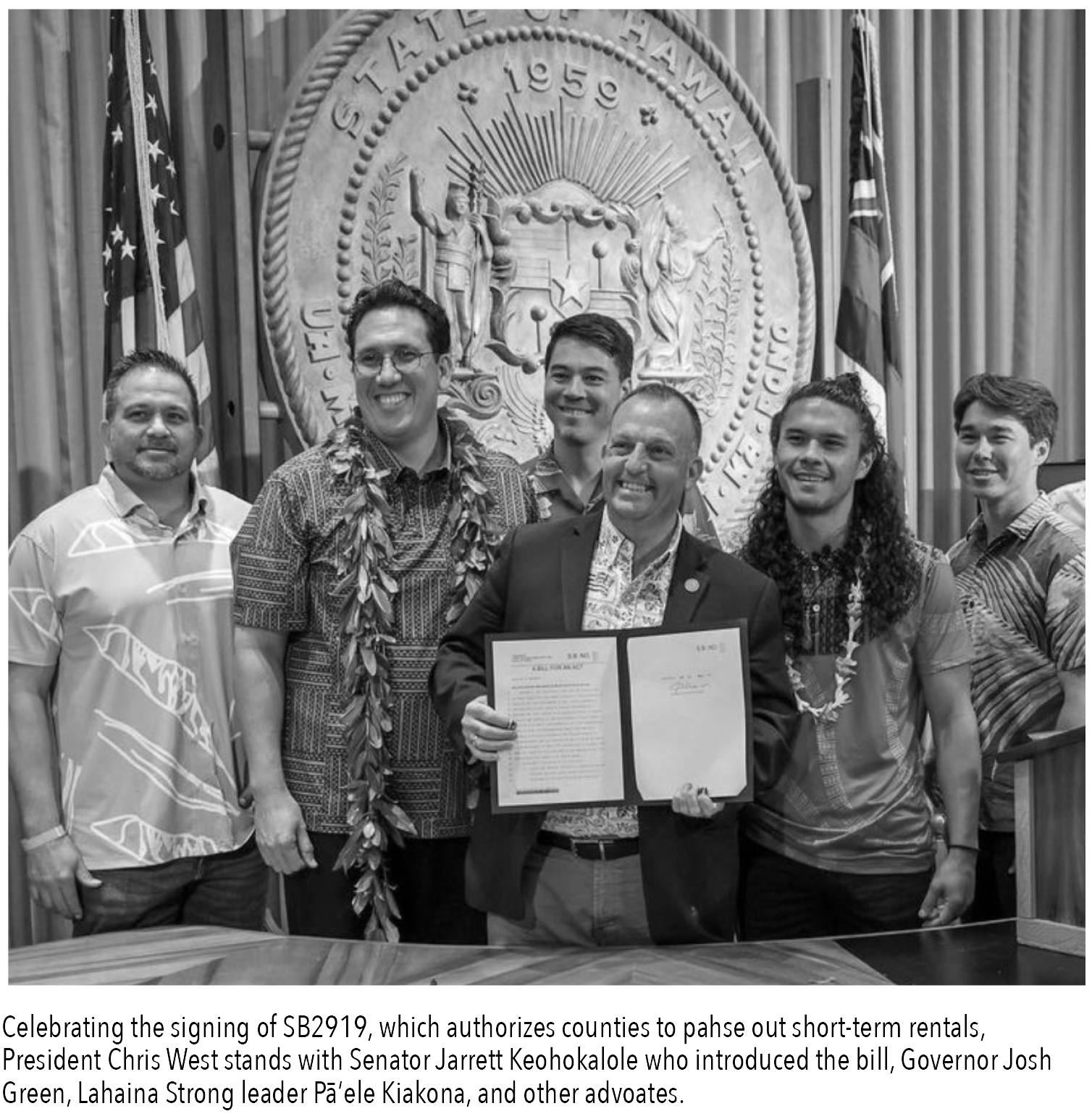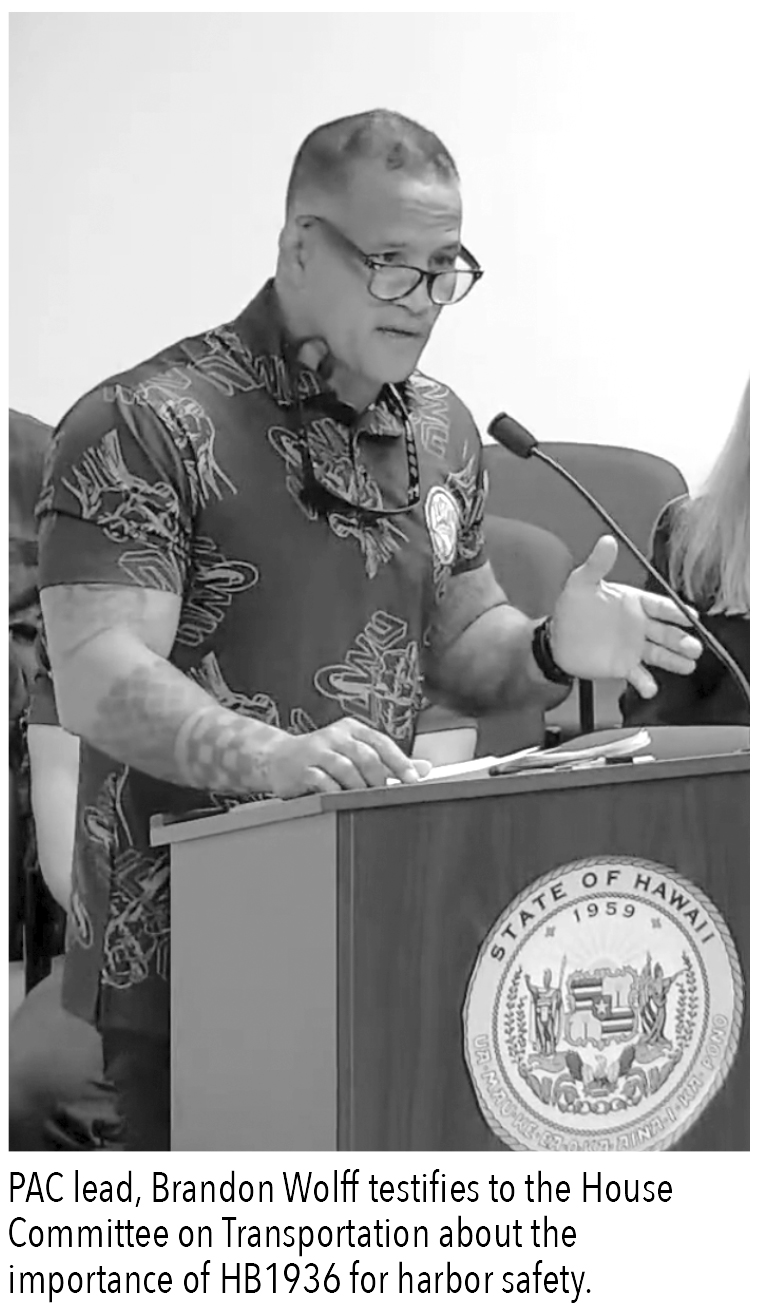Friday, April 3, marked the close
of the 2024 legislative session.
The day was filled with celebratory
speeches by lawmakers, who noted
the “historic” session in which
legislators passed funding to support
Maui fire victims without substantial
cuts to other essential state functions.
The session’s close also marks a historic year for Local 142’s Political Action Committee, who worked daily to move important worker protection legislation to the Governor’s desk. Priority bills included measures to protect jobs, ban union-busting tactics, increase harbor safety, expand health care for wahine firefighters, and phase out short-term rentals across the islands.
The PAC drafted eight bills introduced at the beginning of the session. Two of those bills will become law once the Governor signs them.
The session’s close also marks a historic year for Local 142’s Political Action Committee, who worked daily to move important worker protection legislation to the Governor’s desk. Priority bills included measures to protect jobs, ban union-busting tactics, increase harbor safety, expand health care for wahine firefighters, and phase out short-term rentals across the islands.
The PAC drafted eight bills introduced at the beginning of the session. Two of those bills will become law once the Governor signs them.

from across divisions and industries.
The core legislative team is led by
Legislative Liaison, Brandon Wolff,
who just closed out his second
legislative session in this position.
He was aided by a competent team,
including Brenson Kawailehua
Hansen, Dave Chu, and Collin
Mansanas.
Wolff’s philosophy boils down to what he calls “pono politics for the people” and focuses on collaboration, selflessness, and accountability. “Our
team focuses on building relationships and credibility at the capitol,” Wolff said in an interview with The Voice. “You can’t be a phony. If you’re doing it for yourself, the truth will come out. So, for some of our bills, if the Union had to “eat last,” so to speak, or sacrifice some of our interests in order to come to a good compromise for all stakeholders, we would. Politics is the art of compromise. It’s easy to do the right thing for the right reasons, but it takes time to prove it.”
Wolff’s philosophy boils down to what he calls “pono politics for the people” and focuses on collaboration, selflessness, and accountability. “Our
team focuses on building relationships and credibility at the capitol,” Wolff said in an interview with The Voice. “You can’t be a phony. If you’re doing it for yourself, the truth will come out. So, for some of our bills, if the Union had to “eat last,” so to speak, or sacrifice some of our interests in order to come to a good compromise for all stakeholders, we would. Politics is the art of compromise. It’s easy to do the right thing for the right reasons, but it takes time to prove it.”
ILWU weakens union-busting
Two bills drafted by Local 142 that made it to the Governor’s desk for signature were SB2715 and HB1889. SB2715 is a historic bill that makes Hawaiʻi the 5th state to protect workers from “captive audience meetings.” A captive audience meeting is a union-busting tactic used on workers who are attempting to unionize for the first time. It is commonly used by large corporations such as Amazon, Starbucks, and Target, who force employees to attend meetings on the clock, where they watch films or presentations that attempt to convince workers that unions are bad and undesirable.
Two bills drafted by Local 142 that made it to the Governor’s desk for signature were SB2715 and HB1889. SB2715 is a historic bill that makes Hawaiʻi the 5th state to protect workers from “captive audience meetings.” A captive audience meeting is a union-busting tactic used on workers who are attempting to unionize for the first time. It is commonly used by large corporations such as Amazon, Starbucks, and Target, who force employees to attend meetings on the clock, where they watch films or presentations that attempt to convince workers that unions are bad and undesirable.
Union busting is a profitable
industry. According to the Economic
Policy Institute, companies spent $433
million in 2023 on “union avoidance”
consultants, who coach and conduct
captive audience meetings, among
other tactics. The passage of SB2715
allows employees to refuse to attend
such meetings. It designates captive
audience meetings as Unfair Labor
Practices, ensuring that charges can
be filed against companies forcing
employees to attend or retaliating
against employees who choose not to.
strengthening safety, skill, and
oversight at the ports, the bill
ultimately ensures fewer disruptions
and delays to the supply chain.
Lahaina, wahine healthcare, and kūpuna
Aside from bills that the Local put forward, the PAC also strongly supported a number of other bills that impact our members and the community at large. Among the most news-grabbing of the bills was SB2919, which gives the counties the previously denied authority to phase out short-term rental units.
Lahaina, wahine healthcare, and kūpuna
Aside from bills that the Local put forward, the PAC also strongly supported a number of other bills that impact our members and the community at large. Among the most news-grabbing of the bills was SB2919, which gives the counties the previously denied authority to phase out short-term rental units.
This approach differs from one
that begins with confrontation and
is informed by Wolff’s background
as a Navy Seal. “In battle, no matter
how battered and bruised the warrior
ends up, they’ll be fine. They have a
fighting spirit and know what they’re
going in for. The fallout in battle is
usually the regular people you’re
supposed to be fighting for. It’s the
same in the legislature. So we owe
it to our members and the people of
Hawaiʻi to exhaust all options before
fighting.”

Harbor safety
HB1936 is another significant bill drafted by the PAC and is currently waiting for the Governor’s signature. This bill increases safety in Hawaiian harbors and looks out for the industry as a whole. The new law, once signed, provides the state with a better ability to monitor vessels arriving and departing Hawaiʻi. This will help address issues like illegal cargo and fair state revenue collection, which funds public programs.
The bill also requires trained and experienced workers to provide critical functions for ship docking, particularly mooring. Mooring is the work of securing a vessel to a pier. By requiring skilled workers to perform this work, SB1889 reduces the risk of accidents, injuries, and potential environmental damage to the harbors that can result from improperly secured vessels. By
HB1936 is another significant bill drafted by the PAC and is currently waiting for the Governor’s signature. This bill increases safety in Hawaiian harbors and looks out for the industry as a whole. The new law, once signed, provides the state with a better ability to monitor vessels arriving and departing Hawaiʻi. This will help address issues like illegal cargo and fair state revenue collection, which funds public programs.
The bill also requires trained and experienced workers to provide critical functions for ship docking, particularly mooring. Mooring is the work of securing a vessel to a pier. By requiring skilled workers to perform this work, SB1889 reduces the risk of accidents, injuries, and potential environmental damage to the harbors that can result from improperly secured vessels. By
SB2919 was a priority for Local
142’s PAC team after thousands of
Lahaina residents remained in hotels
following the fires due to a shortage of
rental units in Maui. This legislative
action follows the ILWU-Local 5
joint housing rally last December and
several public statements and articles
about the harm of short-term rentals
put out by Local 142 and other labor,
industry, and community advocates.
The team also lobbied for expanding health care for wahine firefighters to include cancers specific to women. Additionally, the PAC strongly supported a bill that provides training to aid, identify, and help at-risk kūpuna. Similar to the well-known Amber alert system, this bill provides resources for a “silver alert” system.
Pono vs. pilau politics
The Local’s Political Action Committee is made up of members
The team also lobbied for expanding health care for wahine firefighters to include cancers specific to women. Additionally, the PAC strongly supported a bill that provides training to aid, identify, and help at-risk kūpuna. Similar to the well-known Amber alert system, this bill provides resources for a “silver alert” system.
Pono vs. pilau politics
The Local’s Political Action Committee is made up of members
This way of working during the
legislative session, however, should
not be mistaken as passive. When
asked how accountability is carried
out for politicians who aren’t willing
to put the people first, Wolff’s
response was concise: “Elections.”
Every single House Representative
and half of the Senators in Hawaiʻi
are up for re-election in 2024, and the
Political Action Committee is now
turning its attention to the legislative
campaigns.
Next steps
With the 2024 legislative session over, the Political Action Committee is now focusing on 2024 candidate endorsements and elections.
Next steps
With the 2024 legislative session over, the Political Action Committee is now focusing on 2024 candidate endorsements and elections.
